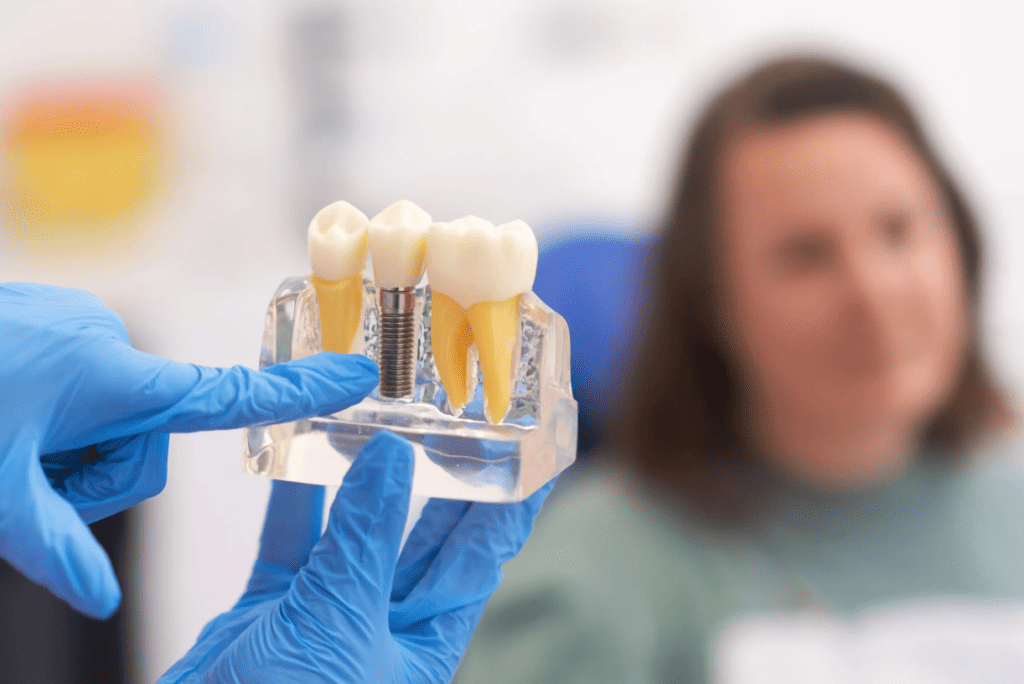Determining whether an individual is a suitable candidate for dental implants is a multifaceted process, involving a thorough evaluation of dental and general health, as well as personal circumstances and expectations.
This post offers a guide to dental implants for anyone considering this option.
In-Depth Analysis of Bone Health
- Bone Quantity and Quality: The success of dental implants hinges significantly on the presence of adequate jawbone. Dentists utilize advanced imaging techniques, such as CT scans, to assess bone density and volume. Patients lacking sufficient bone may require procedures like sinus lifts or ridge expansion.
- History of Bone Loss: Factors contributing to bone loss, including periodontal disease or previous tooth extractions, are considered. A detailed dental history helps in planning potential pre-implantation interventions to enhance bone structure.

Comprehensive Oral Health Assessment
- Periodontal Status: Active gum disease can derail the success of implant surgery. Treatment plans for managing and eradicating gum disease must be initiated before implant placement.
- Oral Hygiene Practices: Candidates must demonstrate a commitment to maintaining oral hygiene. The long-term success of implants depends on diligent care, including routine brushing, flossing, and professional cleanings.
Systemic Health and Lifestyle Factors
- Chronic Conditions: Conditions such as diabetes, osteoporosis, or autoimmune diseases can impact healing and implant integration. Controlled management of these conditions is crucial for implant candidacy.
- Lifestyle Choices: Smoking and excessive alcohol use are significant deterrents to healing and implant success. Patients are often advised to cease these habits well in advance of the implant procedure to improve outcomes.
Age and Developmental Considerations
- Developmental Stage: Dental implants are typically recommended for individuals whose jawbones have fully developed. For younger patients, alternatives may be explored until they reach an appropriate age for implantation.
Psychological and Time Commitments
- Psychological Readiness: Understanding and mentally preparing for the implant process, including its duration and the need for potential follow-up procedures, is vital. Psychological readiness and realistic expectations significantly contribute to patient satisfaction.
- Time Investment: Patients should be aware of the time commitment required for the entire implant process, from surgical placement to the final restoration. Patience and adherence to follow-up appointments are essential for successful outcomes.
Financial Considerations and Planning
- Cost Assessment: Understanding the financial investment involved in dental implant therapy is crucial. Patients should discuss costs, payment plans, and insurance options with their dental provider to ensure they are prepared for the financial aspects of implant treatment. Consulting with a dentist in Athens, TX, can provide clarity on the benefits of dental implants and help patients make informed decisions regarding their dental health investments.
Finalizing Candidacy and Moving Forward
- Customized Treatment Planning: Based on the comprehensive evaluation, a tailored treatment plan is developed. This plan addresses all identified needs, from pre-surgical treatments to enhance bone density to post-operative care strategies.
- Informed Decision-Making: Armed with detailed information about their specific situation, patients can make informed decisions about proceeding with dental implants. Open communication with the dental team ensures that all questions and concerns are addressed prior to beginning the implant process.
Guide to Dental Implants Procedure: A Step-by-Step Journey
Embarking on the journey of getting dental implants is a significant decision that involves multiple stages, each essential for ensuring the success and longevity of the treatment. Here’s what candidates can anticipate:
Initial Consultation and Planning
- Comprehensive Evaluation: The dental implant process begins with a thorough evaluation, including dental exams, X-rays, and possibly 3D imaging, to assess bone density, gum health, and the anatomy of your jaw.
- Treatment Plan Development: Based on the evaluation, your dentist will create a personalized treatment plan. This plan will outline the specifics of your implant procedure, including any preparatory surgeries, such as bone grafting, if necessary.
Surgical Placement of the Implant
- Preparing the Site: The actual implant procedure starts with preparing the site in the jawbone where the implant will be placed. This often involves a surgical procedure under local anesthesia, sedation, or general anesthesia, based on the patient’s needs and preferences.
- Implant Insertion: The dentist or oral surgeon will then insert the titanium implant post into the jawbone. This post serves as a new “root” for the missing tooth.
- Healing and Osseointegration: After placement, a period of healing follows, typically lasting several months. During this time, a process called osseointegration occurs, where the implant fuses with the jawbone, providing a stable foundation for the new tooth.
Abutment Placement and Crown Attachment
- Abutment Installation: Once osseointegration is complete, an abutment, which serves as the connection between the implant post and the replacement tooth, is attached to the implant.
- Final Restoration: The final step involves attaching the custom-made crown, bridge, or denture to the abutment. This prosthetic component is what will be visible above the gum line and will be designed to match the appearance of your natural teeth.

Post-Procedure Care and Maintenance
- Immediate Aftercare: Following each stage of the procedure, patients will receive specific aftercare instructions to ensure proper healing and reduce the risk of complications. This may include guidelines on diet, oral hygiene, and activity restrictions.
- Long-Term Maintenance: Long-term success of dental implants also depends on ongoing care, including regular dental check-ups, cleanings, and adherence to good oral hygiene practices at home.
Understanding Risks and Ensuring Success
- Risk Awareness: While dental implants have a high success rate, it’s important for patients to be aware of potential risks, such as infection or implant failure, and discuss these with their dentist.
- Commitment to Care: The longevity of dental implants significantly depends on the patient’s commitment to proper oral hygiene and regular dental visits. This commitment helps ensure that implants remain functional and aesthetic for many years.
Guide to Dental Implants: Your Path to a Lasting Smile
Embarking on the journey of dental implants involves careful consideration, from assessing candidacy to undergoing the procedure and committing to aftercare. By choosing the right dental professional and adhering to recommended care practices, you can enhance your oral health and enjoy the lasting benefits of a rejuvenated smile.
We hope this guide to dental implants has provided helpful information that you can consider before making a decision.


